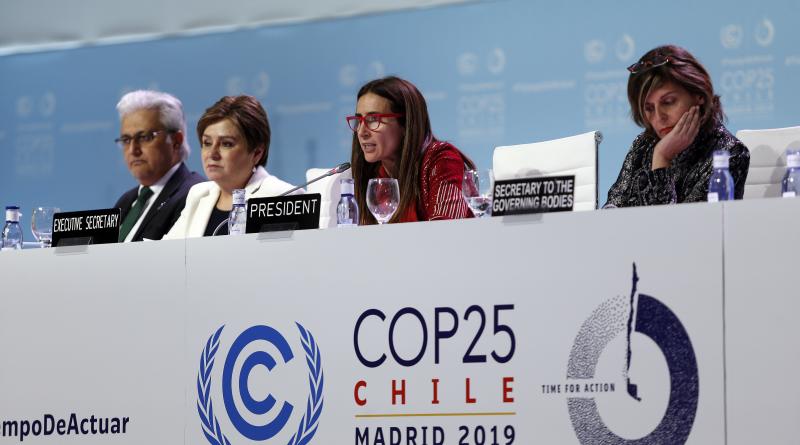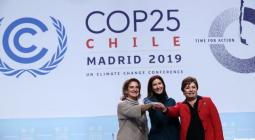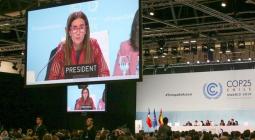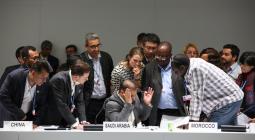COP25: The final disappointing compromised text. Our children deserve better.

The UNFCCC Conference on Climate Change—COP25—came to its conclusion on Sunday 15 December in Madrid, with national governments making progress in a number of critical agreements to promote climate ambition in 2020, a landmark year in which nations must submit or update their Nationally Determined Contributions (NDCs).
When the time for the stocktake arrived, the COP parties managed to reach agreement on several topics, such as including ocean and land ecosystems in the COP25 decision; confirming the importance of science for decision making; establishing an implementation plan for the theme of gender and climate change; renewing the international mechanism protecting against the impacts of climate change (known as ‘loss and damage’), calling for greater ambition through the submission of updated NDCs in 2020; and extending the Global Climate Action programme – focused on promoting and implementing climate action by non- state actors including local governments and businesses – by five years. With respect to Article 6, which seeks to regulate carbon markets to incentivise and deliver private-sector action, parties were unable to reach a consensus, although some important advances were made on technical manuals, enabling critical next steps to be taken in Glasgow in 2020.
The stocktake is positive in terms of the themes agreed by parties but, despite exhausting all possible efforts in a marathon final two days of negotiations, it proved impossible to finalize work on Article 6. “Today, we as countries have remained in debt to the planet”, lamented the COP25 President, Carolina Schmidt, who also noted “the world is watching us and is waiting for concrete solutions from us. For this reason, today we are not satisfied. The agreements reached by parties are insufficient to tackle the crisis of climate change with urgency. There is still no consensus to raise ambition to the levels needed.”
Nevertheless, the Conference did not achieve an agreement regarding Article 6 and the carbon market, one of the fundamental aspects for the final operationalization of the Paris Agreement. “Despite all efforts, it was impossible to reach agreements. Today, all countries have a debt to the planet,” said COP25 President, Carolina Schmidt, who in her closing address also remarked: “The world is watching us and expects concrete solutions from us. For this reason, we are not satisfied. The agreements reached by the Parties are not enough to face with a sense of urgency the climate change crisis. We still do not have the consensus to increase ambition to the levels that are needed”.
Governments agreed unanimously on the state of urgency and the need to increase ambition to respond to climate change in the next half of the century, inviting countries to update their NDCs and to commit to carbon neutrality by. 2050. Stating their commitment under the “Climate Ambition Alliance” (Annex 2), 114 countries expressed their determination to work on updating their NDCs for 2020, raising ambition and 121 countries to work on long-term strategies considering carbon neutrality by 2050 as a goal to achieve in mitigation.
During COP25, Parties have reach agreement on the chapter Loss and Damage of the Warsaw International Mechanism (WIM) that gives support to the most vulnerable people suffering the impacts of the climate change. As part of this decision it was include the Santiago Network on Loss and Damage, as a network to catalyze technical support to face, work and develop capacities in the most vulnerable countries.
In response to the call of science on the need to be carbon neutral by 2050, the “Climate Ambition Alliance” also includes 121 countries, 15 subnational governments, 398 cities, 786 businesses and 16 investors with assets worth 4 trillion dollars. In addition, all of them committed to being carbon neutral by 2050.
In the 25th version of the Conference of the Parties, the extension of the Global Climate Action was extented until 2025 to accelerate the climate action of cities, regions, companies and civil society, supporting countries in the implementation of their commitments under the Paris Agreement.
The agreement reached on gender issues was highly commended by the Parties. The Gender Action Plan (Annex 1) will strengthen the role and the empowerment of women in their respective local communities, providing them with tools to face climate change more effectively.
On the margins of the negotiations, the Agriculture and Forestry Day saw the launching of the Latin American and Caribbean Platform of Climate Action on Agriculture (PLACA), with Ministers from nine countries in the region joining the platform, which will hold its first meeting in March 2020.
In addition, on Energy Day, the Ministers of Chile and Colombia launched the regional goal for Latin America and the Caribbean on Renewable Energies, which seeks to increase the share of renewable energy up to a regional average of 70% by the year 2030.
“We know that climate change is unjust. That is why the Presidency of COP25 focused on changing course in several respects,” said COP25 President Carolina Schmidt.
Another change of course is the transition from negotiation into action, ensuring that climate action cuts across all productive sectors in order to make them part of the solution. For the first time in COP history high-level meetings were held with the ministers who lead the highest Greenhouse Gas (GHG) emitting and capturing sectors: the Ministers of Agriculture and Energy. In addition, the Chilean Pavilion was the venue for the celebration of Transport Day.
Also worth highlighting is the change of course shown by the presence of global finance in climate action, with ministers from this sector meeting for the first time as part of a COP. The Coalition of Finance Ministers, made up of 51 countries, which in turn represent 30% of the world’s GDP, launched an action plan to respond to the climate crisis.
As part of this change of course, the COP25 Presidency also sought to turn science into a key ally, not just with regard to the diagnosis of the problem but also as a guide to its solution. Innovation, technology transfers, capacity-building and nature-based solutions are essential to a more ambitious, more rapid and more effective climate action.
“Raising ambition through bolder climate action plans is crucial for the world to continue on the path of greenhouse gas emissions reduction by 45 per cent in 2030 with respect to 2020 levels and to reach zero net CO2 emissions by 2050”, said UNFCCC Executive Secretary Patricia Espinosa.
In this Blue COP, new topics were also included in climate action. The oceans, which cover two thirds of the planet and are essential for mitigation and adaptation to climate change, were made the center of attention. Thirty-nine countries that subscribe the “Because the Ocean” initiative, which since 2016 has encouraged countries to include an ocean component in their NDCs, joined the Climate Ambition Alliance (see more details below in Annex 1). During 2020, Chile will work alongside the UK to increase the number of countries that will include oceans in their NDCs.
In COP25, Chile launched its platform for ocean solutions based on science, which will bring together initiatives, tools, and methodologies that can be used by governments to develop climate policies for the oceans. This is a contribution to the main objective of improving ambition and protecting the ocean from the effects of climate change.
To enhance adaptation, as part of this change of course a Ministerial Dialogue on Ambition in Adaptation was held, with a strong attendance at the Ministerial level.
During 2020, the COP25 Presidency will move on from the COP of action to that of implementation in Glasgow.
Climate Ambition Alliance
After the launch of the Climate Ambition Alliance during the Climate Summit held in September in New York, which was headed by the Chilean Presidency of COP25, nations renewed efforts in Madrid to increase their actions in 2020 and to achieve the goal of net zero CO2 emissions by the year 2050.
Meanwhile, 103 countries have shown their willingness to submit an enhanced climate action plan—or Nationally Determined Contribution— and recognized the 11 nations that have already initiated the process of updating their national action plans to include a higher level of ambition, as the Paris Agreement stipulates.
In addition, it was announced that 109 Parties to the UNFCCC, 14 regions, 398 cities, 786 businesses and 16 investors are working to achieve the goal of zero net CO2 emissions to confront the climate change crisis. This shows clearly that both States and non-State actors recognize the urgency of taking ambitious action to confront the climate change crisis.
In Madrid, the corporate world enhanced climate ambition with many more companies announcing plans to establish a goal in line with science and the figure of 1.5 degrees of average temperature increase. This movement has doubled in number since September and now includes 177 firms from 36 countries.
This could produce a virtuous cycle of ambition in which government policies and leadership from the private sector reinforce each other, bringing climate action to the next level.
Gender Action Plan
Under the leadership of Chile’s Presidency of COP25, and after intense efforts from its negotiating team, the Parties to the Convention on Climate Change approved today a five year mandate renewal for the “Gender Action Plan (GAP)”. This allows countries to incorporate the gender perspective in the implementation of the Paris Agreement, thus strengthening the role and the empowerment of women in their respective local communities.
Chile assumed the COP25 Presidency on behalf of Latin America and the Caribbean, recognizing that the gender perspective has a fundamental role to play in understanding the disproportionate impact of climate change and the loss of biodiversity on women due to underlying structural inequities, with a view to reducing gaps. Women around the world suffer social, economic, political and cultural discrimination, they are more vulnerable to climate change and the loss of biodiversity, and they have fewer opportunities to develop mitigation and adaptation strategies.
These are some of the reasons that the COP25 Presidency acknowledges the role that women play as agents of change and has made efforts to highlight the importance of making progress along this path with the “Gender Action Plan (GAP)”, as well as through the following actions:
- Organization of the Technical Workshop on Gender, with the support of Costa Rica, the European Union, Peru, and Uruguay, which offered an extraordinary opportunity to foster dialogue and the exchange of perspectives on this issue. It also provided a meeting point to discuss informally about the Lima Work Plan on Gender and the Gender Action Plan, and we are very proud to have contributed to the success of the negotiations.
- Launching of a formal network of women negotiators within the UNFCCC process, focusing on the creation of opportunities among peers and the strengthening of leadership abilities through networks and tutorials for the benefit of women negotiators in the framework of the UNFCCC and with the support of the European Union.
- Joint organization, along with Germany and the UNFCCC Executive Secretariat, of the high-level event on gender justice for climate change and biodiversity. The purpose of this event was to acknowledge and reaffirm the importance and relevance of integrating gender considerations in national and international climate action and biodiversity conservation, with a view to implementing the Paris Agreement and the ongoing development of the Post 2020 Global Biodiversity Framework, part of the Convention on Biodiversity (CBD).
Annex 3:
Further outcomes and highlights
- Fifteen countries presented the latest information on their climate actions at events called the Facilitative Sharing of Views and Multilateral Assessment. Such transparency directly helps inform governments as they increase levels of ambition to tackle climate change.
- Important conclusions on the Local Communities and Indigenous Peoples Platform were achieved, with an initial two-year work plan.
- Decisions were taken which will increase the capacity building potential needed to implement the Paris Agreement.
- The dates and host cities were announced for the suite of 2020 Regional Climate Weeks, which will include for the first time a Climate Week in the Middle East and North Africa (MENA) region, in addition to Climate Weeks in Africa, Latin America & the Caribbean and Asia.
- Members of the data community began working on a framework for tracking the climate action of regions, cities, businesses, investors which can significantly contribute to reaching the goals of the Paris Agreement
- Fifteen game-changing initiatives from more than twenty countries were celebrated as winners of the prestigious UN Climate Action Awards during COP25.
15 December 2019
COP25 / UNFCC




